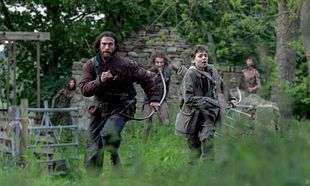Now that the summer blockbuster season is coming to a close, the cinemas are making way for an audience that's ignored by and large by the multiplexes. In the space of three weeks there will be A Grand Seduction, The One Hundred Foot Journey and this independently financed Irish drama. Film fans of a certain age might be seduced by the Downton Abby-esque tale of doomed romance but, if anything, it's trying too hard.
It's 1920 and the War of Independence rages with Black and Tans roaming the back roads of Offaly flushing out IRA suspects. In Glebe House, a once well-to-do country home that has now fallen on hard times, May (Breathnach) shoulders the financial burden, hoping that loyal farmhand Tom (Fortune) can sell off another field to pay for their upkeep. The only other occupant, naïve younger sister Tilly (Bird), is oblivious to her sister's mental strain, giving the glad eye first to Tom's son (Elliot Moriarty), an IRA sympathiser, and then to Captain Shearing (McCarthy), an English officer May finds unconscious in her shed. Hiding the soldier upstairs, May and Tilly fall for his dashing looks but are all too aware that the IRA would execute him, and possibly them, if they were discovered harbouring the enemy...
In a story inspired somewhat by the romance in Ryan's Daughter, A Nightingale Falling is after that grand epic on a limited budget. While they don't exactly pull it off it isn't for the want of trying. Like last year's independently produced Irish feature A Belfast Story, A Nightingale Falling is overcooked in places. Graeme Stewart's grandiose soundtrack is overused and intrusive (do we really need soaring strings when May is taking the washing off the line?) and while the flowery narration can be explained away by May's wordy diary entries, they do the job that visuals and dialogue could easily do.
Tara Breathnach, her performance nominated for Best New Talent at this year's Galway Film Fleadh, gives it socks as the under pressure matriarch and if anything she could have eased back on the throttle. The three leads fail to drum up the requisite chemistry to keep the ménage á trois bubbling with a little sex, however.
But it looks the part. The house is kept deliberately icy and sparse and lonely, with Breathnach and Bird clomping their way across creaky floorboards that boom with each step. In stark contrast to these cold interior sets, the exterior scenes are attractively shot in a warm hue (Daly doubling up as cinematographer), belying the dull autumn and winter months the story is set - the Irish countryside can look beautiful when there's an eye behind the camera.













































































